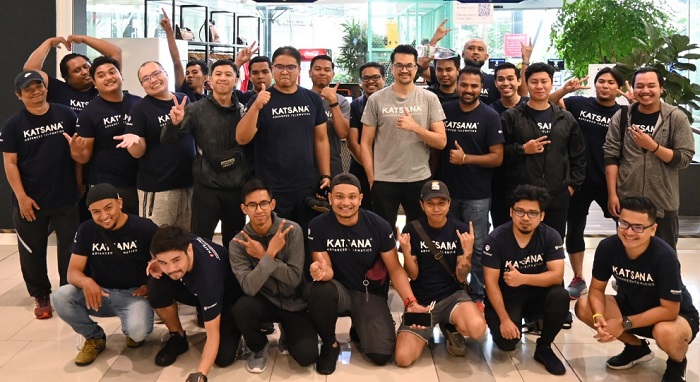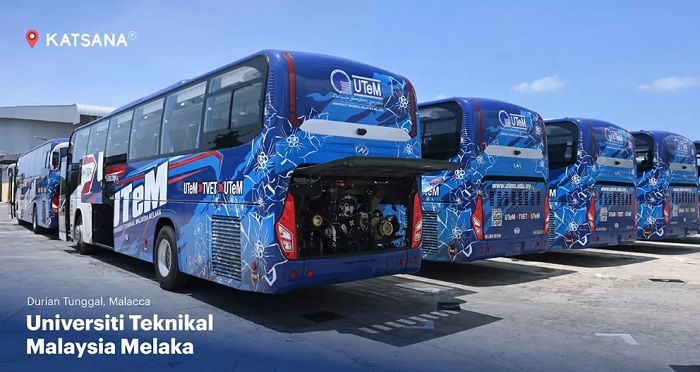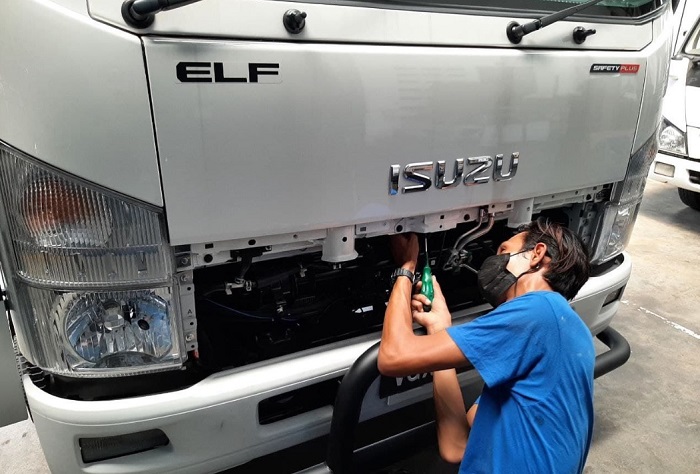Syed Ahmad Fuqaha believes there’s blue in the red ocean, and, in letting startups fail while it’s cheap
By Dashveenjit Kaur July 15, 2024
- 10th year as entrepreneur with Katsana, an enterprise mobility solutions provider
- Shutting down a key product yielded hard lessons of adapting to market realities

"To nurture young startups, you have to let them fail. Let them fail when it's still cheap," asserts Syed Ahmad Fuqaha, founder and CEO of Katsana which he launched in April 2014. Reflecting on a decade of entrepreneurship, he doesn't mince words about the startup ecosystem: "Today, there's almost no avenue to fail. It's the antithesis of entrepreneurship. Entrepreneurship is about failing, failing fast and cheaply. If anyone were to ask me for feedback on what the government should be doing, I'd say they should give startups more chances to fail."
Elaborating on this he points out that under current funding requirements, founders are expected to give directors guarantee that their debt is secured. "Even when the entity that is giving the funding is a government agency that is supposed to nurture entrepreneurship. As a result, the funding agencies in Malaysia behave like a bank instead of a partner to startups."
The impact of this is to crush the innovative and bold spirit. "Strict funding terms would mean only proven business models will get funded. For new models, the process of getting funding will end up shaving off the innovative aspects of the disruption because it's too risky for our agencies," he said. "We end up with tame ideas," he warns.
If we want impact, then disruptive ideas should be encouraged, he urges.
"To encourage disruption to the status quo, startup funding should be lenient," he states. "Allow founders to try new things and fail gracefully. Don't punish them with crushing debt that take years to settle."
As his company celebrates its 10th anniversary, Fuqaha advocates for a radical shift in how we nurture young businesses. His message is clear: create more opportunities for startups to fail early and inexpensively. It's a philosophy that flies in the face of many government initiatives, which Fuqaha, who was a manager with startup JomSocial which was sold in 2013 to a Silicon Valley company, sees as overly protective. In his view, true entrepreneurship thrives on the freedom to take risks, stumble, and learn from those missteps.
This counterintuitive approach to fostering innovation has shaped Fuqaha and Katsana's journey from a fledgling startup to a focused enterprise provider offering integrated fleet solutions with over 3,600 customers, while offering valuable lessons for entrepreneurs. Along the way he has raised US$1.39 million (RM6.5 million) in funding from Axiata's Digital Innovation Fund (ADIF) managed by Intres Capital in 2016 and US$321,100 (RM1.5 million) in venture debt from Malaysian Debt Ventures (MDV) in 2022.
[Ed: Para edited for accuracy. An earlier version gave the wrong amount Fuqaha received from MDV.]
Lesson 1: Know when to cut your losses
 Fuqaha's words aren't just rhetoric – they're born from experience. Katsana's own journey is punctuated by calculated risks and strategic pivots, perhaps best exemplified by the rise and fall of DriveMark, one of the company's early innovations it launched in mid 2016.
Fuqaha's words aren't just rhetoric – they're born from experience. Katsana's own journey is punctuated by calculated risks and strategic pivots, perhaps best exemplified by the rise and fall of DriveMark, one of the company's early innovations it launched in mid 2016.
DriveMark was a smartphone-based scoring system designed to encourage safer driving, aiming to bridge the gap between driver behavior and insurance premiums. At its peak, it boasted an impressive 80,000 to 90,000 users. "We came up with a solution that is very much scalable, using smartphones," Fuqaha explains, highlighting the system's accessibility and initial promise.
However, DriveMark soon encountered challenges unique to the Malaysian market. Unlike in the US or UK, where insurance premiums for young or first-time drivers can be exorbitantly high, Malaysian premiums are comparatively low. "In Malaysia, on average, if I'm not mistaken, takaful is around US$150 (RM700). For general insurance, the premium is around US$192.7 (RM900) on average.”
This pricing structure created a fundamental challenge for DriveMark's business model. While top performers with the highest DriveMark scores could receive significant rebates of up to RM160, funded entirely by DriveMark, the majority of users fell into a less exciting category. "For a majority of users, the RM15-RM20 in rebate is just too small to be meaningful," Fuqaha explains, highlighting the bell curve distribution of benefits.
[RM1 = US$0.214]
Ultimately, DriveMark's business model proved unsustainable. Relying on insurance renewal commissions that averaged only RM70 to RM80 per user, the economics didn't work out. Despite some decent revenue, Katsana made the tough but necessary decision to discontinue DriveMark two years into the pandemic. "We just decided to kill it," Fuqaha states, acknowledging the need to adapt to market realities
The decision wasn't made hastily. In fact, Katsana spent a year exploring ways to pivot and salvage the technology. "We shut DriveMark down in 2022 after a year of mooting the idea and trying to pivot it into a way for enterprises to measure Scope 3 carbon emissions, in particular involving mobility emissions," Fuqaha said.
The process was handled with a strong emphasis on user privacy and data protection. "The shut down meant erasure of user data, as we did not want to abuse the consent they gave to DriveMark," Fuqaha explains.
This decision to shutter DriveMark, while difficult, exemplifies Fuqaha's philosophy of adapting. It allowed Katsana to refocus its resources on more promising areas of its business, ultimately leading to the more sustainable enterprise market as a solutions provider.
The experience of DriveMark became a valuable lesson in Katsana's decade-long journey, illustrating the importance of adapting to market realities and being willing to let go of initiatives that don't align with the company's core strengths or financial viability.

Lesson 2: The pandemic pivot: Finding the silver lining
As with businesses worldwide, the Covid-19 pandemic forced Katsana to reevaluate its operations. However, Fuqaha views this disruption as a "silver lining" that allowed the company to sharpen its focus.
Prior to the pandemic, Katsana operated in multiple segments of the vehicle telematics market. The company offered GPS tracking solutions for private vehicles, ran the DriveMark smartphone-based driver scoring system, and provided fleet management solutions for enterprise clients such as bus and taxi operators. They were also exploring opportunities in the insurance sector, leveraging their data and technology to potentially offer usage-based insurance products.
"The pandemic was a silver lining for us. We decided to focus on the three [areas] that really made sense for us financially and to stop offering tracking for private vehicles,” Fuqaha said.
While there was money to be made in the private vehicle market, the economics simply didn't work for Katsana’s high-touch operational model. "For private vehicles, we have so many competitors out there. There are so many GPS trackers you can even get on Shopee for approximately RM70," Fuqaha points out.
The strategic refocus meant Katsana would concentrate primarily on its enterprise solutions, particularly fleet management for businesses. This allowed the company to leverage its strengths in developing sophisticated, tailored solutions that go beyond the capabilities of off-the-shelf products.
"What we are doing for enterprises, it makes a lot of sense and it is the best use of our capability," Fuqaha explains. This shift meant moving away from the consumer market and focusing on larger clients with more complex needs.
By streamlining its offerings, Katsana was able to focus its resources on developing more advanced fleet management solutions, including features for monitoring driver behavior (building on its DriveMark experience), vehicle performance, and operational efficiency.
This refocus allowed Katsana to differentiate itself in a crowded market. While many competitors offer white-label solutions from countries like China, Katsana’s intensified focus enabled it to develop unique, high-value offerings for enterprise clients. "What we do is quite unique," Fuqaha asserts, highlighting the company's established expertise in providing sophisticated fleet management tools for larger operations.
The pandemic-induced strategic realignment thus transformed Katsana from a company spread across multiple market segments to a more focused operation. This change not only helped the company weather the storm of the pandemic but also positioned it for more sustainable growth in the post-pandemic economy.

Lesson 3: Strategic focus trumps rapid expansion
Fuqaha’s journey has included expanding regional, leading to ongoing projects in Indonesia and Brunei. This expansion predated the pandemic. However, he remains cautious about further expansion. "It is an interesting proposition, but right now, if you want to have a broader presence over there, it is going to stretch us thin.”
This measured approach to growth demonstrates a maturity born from experience. Rather than chasing every opportunity, Fuqaha has learned to play to its strengths and maintain a laser focus on its core competencies, even as it continues to serve its existing regional clients.
This strategic focus proved crucial when the pandemic hit, posing significant challenges to businesses worldwide. Katsana, however, managed to navigate the turbulent times without reducing its workforce, which currently stands at around 45 employees. The company's resilience stemmed from a combination of its focused strategy and pragmatic decision-making.
"During the pandemic, we made a conscious decision not to hire anymore," Fuqaha reveals, highlighting the importance of adaptability in times of crisis. Instead of battling against uncontrollable market forces, he opted for a more measured approach. At the same time he made strategic use of government support, taking advantage of the Covid Relief Fund for Startup program offered by Malaysian Debt Ventures to shore up finances.
This dual strategy of maintaining focus on core competencies while leveraging government support mechanisms allowed Fuqaha to weather the storm effectively.
Looking to the future: A focused SaaS vision
As Katsana enters its second decade, it does so with a clearer vision and a more focused strategy than ever before. "Before the pandemic, we had a lot of things on our plate," Fuqaha reflects. "We are more focused now. No doubt, right before the pandemic, we were on the verge of profitability, even last year we were."
This journey from a multi-faceted startup to a specialized enterprise solutions provider encapsulates many of the challenges faced by tech companies in emerging markets. Fuqaha’s story is one of learning to ignore the siren song of diversification when focus and specialization are what's truly needed.
Looking ahead, Fuqaha has set his sights on transforming Katsana into a Software as a Service (SaaS) company. This shift aims to leverage the company's expertise in fleet management and telematics into a scalable, cloud-based solution. By moving towards a SaaS model, Katsana can potentially reach a broader market while streamlining its operations and reducing hardware dependencies.
"We're developing solutions that are quite unique," Fuqaha says, hinting at the sophisticated software capabilities that will form the core of their SaaS offering. This transition aligns with global trends in enterprise technology and positions Katsana to compete more effectively in both local and international markets.
As Fuqaha celebrates his 10th anniversary as a founder, his journey has yielded invaluable insights that could benefit other startup founders. "Opt for proven business models," he advises, noting that while startups are often encouraged to chase 'blue ocean' opportunities, 'red oceans' still present plenty of opportunities for those who understand their market and positioning well. "Red oceans are often large enough for multiple providers to co-exist, each with their own unique offering."
Moreover, Fuqaha emphasizes the importance of nurturing existing customer relationships. "Existing customers are your best sales channel. Don't just create new features and increase the perceived value of your products, do spend time to reconnect with existing customers to turn them into your proponents. Meet them at kopitiams, send them greeting cards, set up webinars. These are soft approaches that work," he advises.
In an industry where many chase the next big thing, Katsana has found success by honing in on what it does best – providing top-tier fleet management solutions to enterprises that truly need them – while also valuing and cultivating its existing customer base. After all, with a decade of hard-earned wisdom under its belt, Katsana, in the view of Fuqaha, is well-positioned to navigate the roads ahead, wherever they may lead.
Related Stories :


